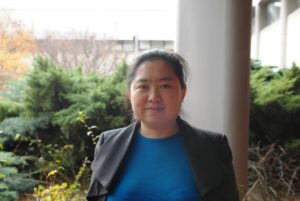
Providing legal support for asylum seekers in South Australia in their desperate bid for temporary protection visas has its challenges, but also its personal rewards for Flinders University lecturer Dr Sanzhuan (Sandra) Guo.
As part of her role at Flinders, Dr Guo is the supervising lawyer and migration agent for the university’s innovative Migration Clinic which marks its first anniversary next month.
The clinic was formed following changes to immigration laws in December 2014 which introduced a ‘fast track’ assessment process for asylum seekers who arrived unauthorised by boat between August 2012 and January 2014, and resulted in a big jump in demand for legal support.
In partnership with the Refugee Advocacy Service of South Australia Inc (RASSA), now based at Flinders’ Victoria Square campus, the Migration Clinic provides limited pro-bono assistance to asylum seekers eligible to claim for a temporary protection visa.
Dr Guo said language barriers and communicating via interpreters, working under pressure to meet “incredibly tight deadlines” for applications and emotional challenges mean working with asylum seekers was demanding, but satisfying.
“I find it very rewarding because it’s such an important part of the process, there is no full merits review if this primary application is refused,” Dr Guo said.
“The emotional challenge is always there. When I first started hearing their stories I thought this really can’t be happening to these clients.
“It’s been important for me to manage my emotions and keep to the objectives to get the job done.”
Dr Guo said the clinic’s role was not to act on behalf of clients but to assist with the preparation of visa applications and statement of claims for the Department of Immigration and Border Force’s primary assessment of cases, a crucial part of the process for an asylum seeker to be successfully granted a temporary visa.
Under the ‘fast track’ process, the department makes a primary assessment of an asylum seeker’s claim for protection. If their application is denied, these asylum seekers are not able to re-apply to the Refugee Review Tribunal for a review of that decision, only for a much more limited review of their application.
Dr Guo joined Flinders University in February 2015, building on her career as an international lawyer who practiced immigration law with a leading Melbourne-based firm.
She works at RASSA every Wednesday and is assisted by Flinders law students who gain valuable practical experience in migration and refugee law. Currently around 2500 asylum seekers are located in South Australia, with more than 70 on a waiting list with RASSA for assistance with temporary visa applications.
Flinders Legal Advice Clinic practice manager and senior solicitor Jocelyn Milne, who also oversees the Migration Clinic, said the work experience gained through RASSA provided Flinders law students with a unique opportunity to work face-to-face with asylum seekers and gain invaluable knowledge in this field.
“The students find it to be really rewarding and almost all of them who do this work experience go on and continue to volunteer in this area of law,” Ms Milne said.
“A major focus of our clinics is to improve students’ skill and mind sets so they are job ready. We expect the demand for migration law services will only continue to increase in the future.”
The Migration Clinic is part of the Flinders Legal Advice Clinic, which was established by the Flinders Law School as an independent legal service in 2012, to provide a free advice service staffed by law students from Flinders University. Qualified legal practitioners supervise the clinic, which is open to staff, students and the wider community.
The Director of Professional Programmes at Flinders Law School, Deborah Ankor, said the university recognised an urgent need last year to extend its legal services to asylum seekers and therefore put in place a memorandum of understanding to collaborate with RASSA in delivering its Migration Assistance Project.
Ms Ankor said it was the only legal migration service being offered to refugees by a university in South Australia and there were plans to expand its services to include refugees in the future.
RASSA chairperson and barrister Taruna Heuzenroeder, herself a Flinders graduate, said the organisation was very happy to partner with Flinders University to deliver the Migration Assistance Project.
“Resources are incredibly scarce in the community legal sector and RASSA has never received any recurrent funding. We have also been lucky to secure one-off grants from Community Benefit SA, the Broadly Trust and the Law Foundation of South Australia to support this project, but without Flinders University’s support we would not have been able to provide this service,” Ms Heuzenroeder said.
Ms Heuzenroeder also knows first-hand the impact volunteering with asylum seekers can have on law students. She first began volunteering for RASSA while studying at Flinders in 2002 and has been involved with the organisation ever since.
“The interviewing skills that I gained working with asylum seekers at Woomera and Baxter Detention Centres have served me very well in my career as a lawyer,” she said.
“But even more importantly, the experience I gained with RASSA demonstrated to me just how powerful the legal skills I was developing could be used to fundamentally change people’s lives. It is a lesson I have never forgotten.”
June 19-25 is Refugee Week 2016, celebrating the positive contributions of refugees to Australian society.

